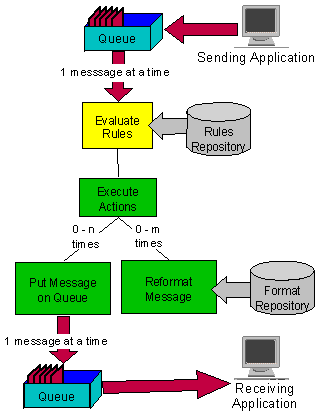Rules for MQSeries Integrator:
The Backbone of Enterprise Application Integration
|
Contents
MQSeries Integrator: The new product from IBMMQSeries Integrator, the new product from IBM, is a toolkit that provides the components you need to implement enterprise-wide application integration. MQSeries Integrator includes MQSeries and Rules* and Formatter*.
Rules* for MQSeries Integrator: Intelligent Rules-Based Message RoutingAcross your business computing enterprise, MQSeries Integrator allows you to map your business processing onto Rules* for MQSeries Integrator (Rules for short), and as your business grows MQSeries Integrator grows with it. MQSeries Integrator lets you develop message-driven processing rules for managing data flows between message senders and receivers.You can use the Rules as part of MQSeries Integrator in combination with Formatter* and MQSeries or you can use the Rules API alone (and write the code necessary, so it works with any formatter and message queuing programs). Best of all, with MQSeries Integrator, you can create dynamic routing and data interchange flows. Sophisticated Rules functionality reduces messaging overhead with content-based message recognition and routing without architectural limits. Since the analysis of fields is rules-based and table-driven, you can add, modify, or examine new message formats and fields without changing the user's program. Rules supports the creation and dispatch of multiple messages to multiple destinations from a single input message, while allowing different formats for each. The dynamic nature of Rules means updates can be effective immediately, staged over time, or delayed, which gives your MIS staff the flexibility necessary to control modifications in a rapidly changing environment. Rules helps you manage data across applications, databases, platforms, and networks. No matter which types of rules are most important to your business - accounting rules, MRP rules, any kind of business or processing rules - MQSeries Integrator makes Rules the backbone of your business enterprise.
MQSeries Integrator Rules SpecificationA rule may consist of arguments, operators, and values or comparison columns used to test message contents. Each operation tests the existence of a message column or field. Each operation can also test the value of a message column or field.
MQSeries Integrator Rules RepositoryMQSeries Integrator is easy to manage. The Rules repository resides in standard relational tables, leveraging the performance of the RDBMS, making access easy (even with lots of rules). This feature also makes queries, reports, and impact analysis easy to execute and manage. Rules can be distributed or stored centrally, and MQSeries Integrator itself can be used for installing rules in distributed databases. As business processes change, you can adapt and change "on the fly" without re-engineering or reprogramming. Even better, you can create MQSeries Integrator rules that can modify other MQSeries Integrator rules in precise circumstances, and you can have these various Rules repositories located across the enterprise.
MQSeries Integrator Intelligent Routing ArchitectureMQSeries Integrator's intelligent routing takes the responsibility for data dissemination away from individual applications and consolidates it into the manageable and scaleable configuration domain of Rules.Freeing the sending application from a commitment to support the formats expected by receivers provides flexibility to modify or add applications without changing any code. Eliminating the need to change code also removes the need to re-test applications, so the effort and time required to handle changes is greatly reduced.
High Performance, Content-Based Rules EvaluationMQSeries Integrator Rules delivers a superior level of flexibility and performance. Prior to MQSeries Integrator, rules-based evaluation mechanisms were primarily limited to one of two categories: transactional and context (or inference). Simple transactional mechanisms, to keep up with ever-changing environments, are high-maintenance and are not expressive (with regard to selecting message subscribers), but offer high performance. Context or inference mechanisms perform poorly in complex environments with large numbers of rules, but are extremely expressive (with regard to selecting message subscribers).
MQSeries Integrator Rules - A Unique ArchitectureMQSeries Integrator Rules uniquely combines the ability to support the high degree of expressiveness that is possible in inference-type designs with the high throughput of simpler transactional designs. In addition, MQSeries Integrator Rules continues to maintain a constant (and high) performance characteristic, regardless of the number of rules to be evaluated, potentially up to millions of rules.MQSeries Integrator Rules provides expressiveness features, allowing receiving applications to assert rules that select, with very fine granularity, only those messages that meet their particular needs. By using rules for such evaluation, no reprogramming of the sending process is ever needed for new receivers. The MQSeries Integrator Rules can examine the value of any field or group of fields in the message to make its determination. Rules can further combine AND and OR conditions without any architectural limits on the number or complexity of expressions. The rules are table-driven and allow new message formats and fields to be added, modified or examined without changing any code, making Rules completely generic. Rules is capable of combining any number of expression arguments (based on column values or ranges) into a logical rule. Using AND and OR these arguments become complex conditional expressions. Columns can be tested against discrete values or compared to other columns. Additionally, MQSeries Integrator Rules supports creation and dispatch of multiple new, independently formatted and delivered messages to multiple destinations or processes from a single input message.
MQSeries Integrator Rules: Major Features
Benefits Summary
Where to Find More InformationIBM United Kingdom Ltd.Hursley Park Winchester Hampshire SO21 2JN
|
